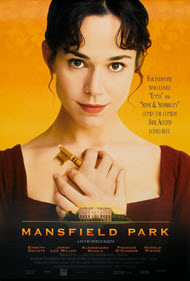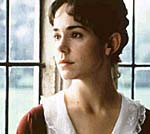Mansfield Park
 for brief violent images, sexual content and drug use.
for brief violent images, sexual content and drug use.
Reviewed by: Robin Joy Wardzala
CONTRIBUTOR
| Moral Rating: | Average |
| Moviemaking Quality: |
|
| Primary Audience: | Adults |
| Genre: | Romance Drama |
| Length: | 1 hr. 38 min. |
| Year of Release: | 1999 |
| USA Release: |
| Featuring |
|---|
| Frances O'Connor, Jonny Lee Miller, Alessandro Nivola, Embeth Davidtz, Harold Pinter |
| Director |
|
Patricia Rozema |
| Producer |
|
Sarah Curtis |
| Distributor |
While the plot of “Mansfield Park” is predictably formulaic and very similar to Jane Austen’s other novels, there is a hint of poignancy and introspection that gives the film some depth. The principle characters are all unique and somewhat quirky in their own way. As a matter of fact, it is their personalities that keep the story interesting.
The film’s premise is fairly simple. Fanny Price (Frances O'Connor), is an outspoken girl with a creative mind and an affinity for writing. At a young age, she is sent to live with her aunt at Mansfield Park, an elegant English estate. As she grows up, she forms a deep friendship with the estate owner’s son, Edmond Bertram. Her comfortable life changes when the dashing Henry Crawford and his sister Mary move into the parsonage next-door. The Bertram sisters, Julia and Mariah, both fall for Henry. Mariah is engaged to be married to a rich, ignorant slob, but this doesn’t stop her from throwing herself at the handsome stranger. Edmond is captivated by Mary, making Fanny rather jealous. Eventually, though, Fanny is offered a proposal, and must decide whether to marry for money or wait for love.
Potential viewers should be aware that there is a strong sexual undercurrent throughout the film that is somewhat unsettling. One particular scene involves a married woman in bed with another man. Nothing except the man’s bare back is shown, but the implications are obvious. Also, Fanny is shown flipping through a sketchbook with graphic pictures of slaves being tortured and sexually abused. This is rather disturbing, but the effect is lessened by the fact that Fanny flips the pictures very quickly. Slavery is a recurring theme in this film, and is portrayed in several different ways. One involves the captivity and treatment of African-American slaves. Another more subtle reference shows Fanny’s life as that of a person who is trapped in a situation and can’t get out; a slave to circumstances.
Nevertheless, “Mansfield Park” has several good qualities. It is very unusual to find such a clean film. There is absolutely no foul language, and Fanny is everything one could hope for in a heroine. She also believes in going to church and appears to hold Christian beliefs. Another positive element is Edmond’s decision to go to seminary school and study to become a parson.
Aside from the aforementioned disturbing elements, I found this film to be a quality piece of movie-making with a wonderfully satisfying happy ending.


The scene in which the leading lady leafs through an album containing drawings of racial atrocity is done in a rapid succession of very quick cuts and while maybe none of this is “True To Jane”—it’s true to life while not being gratuitous due to the gracious editing. The racial atrocity scene lends a depth of content quite absent from previous Austen adaptations. Don’t expect the sweet and innocent carriage ride of the previously mentioned two films—but don’t be put off—because in the demonic onslaught of recent films—this one is more than passable. Is there a moral to the story? Only the same moral as in “Sense” and “Emma.” I won’t belabour the obvious by giving it away right now. This is “Austen with an Edge.” Carnal but not gratuituous. At least I cared about the people and what happened to them. [3/4]
In my opinion, the material that was cut—albeit by necessity—is more of a problem than the material that was added. For example, the insertion of occasional references to the slave economy of the West Indies—and to the family’s dependence on that economy for its privileged lifestyle—makes sense to me, in a way that (for example) Kenneth Branaugh’s translation of “Hamlet” into the 19th Century never did make sense. These references to slavery have drawn a lot of attention among reviewers; they end up altering our impressions of the character of Sir Thomas Bertram and his eldest son Tom. (Sir Thomas comes off rather less sympathetically, but young Tom perhaps slightly more than he would have otherwise). Of course, from a Christian perspective, it is entirely appropriate to consider the moral issues underlying the source of the Bertram family’s wealth… Much of what is being read, viewed, and listened to as “entertainment” today is rather shallow and ephemeral.
I hope that this movie, by presenting one of Jane Austen’s novels in an intriguing and exciting light, will draw more people to read Austen’s books. [4/4½]
Adultery and other sexual indiscretion is only told about from a distance. The adultery in this version of “Mansfield Park” is shown by having the heroine interrupt the lovers in the very act. The other grossness is shown by having the heroine leaf through a sketchbook of charcoal drawings of rape, mutilation and murder of slaves. There are minor scenes of erotic behavior between two women as well. This is so contrary to the spirit of Jane Austen. It offends in every possible sense. [2/1½]



